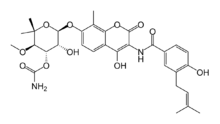
Aminocoumarin
Encyclopedia

DNA gyrase
DNA gyrase, often referred to simply as gyrase, is an enzyme that relieves strain while double-stranded DNA is being unwound by helicase. This causes negative supercoiling of the DNA...
enzyme involved in the cell division in bacteria
Bacteria
Bacteria are a large domain of prokaryotic microorganisms. Typically a few micrometres in length, bacteria have a wide range of shapes, ranging from spheres to rods and spirals...
. They are derived from Streptomyces
Streptomyces
Streptomyces is the largest genus of Actinobacteria and the type genus of the family Streptomycetaceae. Over 500 species of Streptomyces bacteria have been described. As with the other Actinobacteria, streptomycetes are gram-positive, and have genomes with high guanine and cytosine content...
species, whose best-known representative - Streptomyces coelicolor
Streptomyces coelicolor
Streptomyces coelicolor is a soil-dwelling Gram-positive bacterium that belongs to the genus Streptomyces.-Usage in biotechnology:Strains of S. coelicolor produce various antibiotics, including actinorhodin, methylenomycin, undecylprodigiosin, and perimycin. Certain strains of S. coelicolor can...
- was completely sequenced in 2002.
The Aminocoumarin antibiotics include:
- NovobiocinNovobiocinNovobiocin, also known as albamycin or cathomycin, is an aminocoumarin antibiotic that is produced by the actinomycete Streptomyces niveus, which has recently been identified as a subjective synonym for S. spheroides a member of the order Actinobacteria . Other aminocoumarin antibiotics include...
, Albamycin (PharmaciaPharmaciaPharmacia was a pharmaceutical and biotechnological company in Sweden.-History:Pharmacia was founded in 1911 in Stockholm, Sweden by pharmacist Gustav Felix Grönfeldt at the Elgen Pharmacy. The company is named after the Greek word φαρμακεία, transliterated pharmakeia, which means 'sorcery'...
And UpjohnUpjohnThe Upjohn Company was a pharmaceutical manufacturing firm founded in 1886 in Kalamazoo, Michigan by Dr. William E. Upjohn, an 1875 graduate of the University of Michigan medical school. The company was originally formed to make friable pills, which were specifically designed to be easily digested...
) - Coumermycin
- ClorobiocinClorobiocinClorobiocin is an aminocoumarin....
Structure
The core of aminocoumarin antibiotics is made up of a 3-Amino-4,7-dihydroxycumarin ring, which is linked, e.g., with a sugar in 7-Position and a benzoic acid derivative in 3-Position.Clorobiocin is a natural antibiotic isolated from several Streptomyces
Streptomyces
Streptomyces is the largest genus of Actinobacteria and the type genus of the family Streptomycetaceae. Over 500 species of Streptomyces bacteria have been described. As with the other Actinobacteria, streptomycetes are gram-positive, and have genomes with high guanine and cytosine content...
strains and differs from novobiocin
Novobiocin
Novobiocin, also known as albamycin or cathomycin, is an aminocoumarin antibiotic that is produced by the actinomycete Streptomyces niveus, which has recently been identified as a subjective synonym for S. spheroides a member of the order Actinobacteria . Other aminocoumarin antibiotics include...
in that the methyl group at the 8 position in the coumarin ring of novobiocin
Novobiocin
Novobiocin, also known as albamycin or cathomycin, is an aminocoumarin antibiotic that is produced by the actinomycete Streptomyces niveus, which has recently been identified as a subjective synonym for S. spheroides a member of the order Actinobacteria . Other aminocoumarin antibiotics include...
is replaced by a chlorine atom, and the carbamoyl at the 3' position of the noviose sugar is substituted by a 5-methyl-2-pyrrolylcarbonyl group.
Mechanism of action
The Aminocoumarin antibiotics are known inhibitors of DNA gyraseDNA gyrase
DNA gyrase, often referred to simply as gyrase, is an enzyme that relieves strain while double-stranded DNA is being unwound by helicase. This causes negative supercoiling of the DNA...
. Antibiotic
Antibiotic
An antibacterial is a compound or substance that kills or slows down the growth of bacteria.The term is often used synonymously with the term antibiotic; today, however, with increased knowledge of the causative agents of various infectious diseases, antibiotic has come to denote a broader range of...
s of the aminocoumarin family exert their therapeutic activity by binding tightly to the B subunit of bacterial DNA gyrase
DNA gyrase
DNA gyrase, often referred to simply as gyrase, is an enzyme that relieves strain while double-stranded DNA is being unwound by helicase. This causes negative supercoiling of the DNA...
, thereby inhibiting this essential enzyme. They compete with ATP
for binding to the B subunit of this enzyme and inhibit the ATP-dependent DNA supercoiling catalysed by gyrase. X-ray crystallography studies have confirmed binding at the ATP-binding site located on the gyrB subunit of DNA gyrase
DNA gyrase
DNA gyrase, often referred to simply as gyrase, is an enzyme that relieves strain while double-stranded DNA is being unwound by helicase. This causes negative supercoiling of the DNA...
.. Their affinity for gyrase is considerably higher than that of modern fluoroquinolones
Quinolone
The quinolones are a family of synthetic broad-spectrum antibiotics. The term quinolone refers to potent synthetic chemotherapeutic antibacterials....
, which also target DNA gyrase but at the gyrA subunit.

